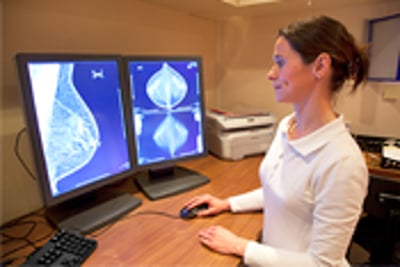FORCE's eXamining the Relevance of Articles for You (XRAY) program looks behind the headlines of cancer news to help you understand what the research means for you.
XRAY is a reliable source of hereditary cancer research-related news and information.
Learn more about the XRAY program
In portal: Breast Cancer, Categories Prevention, Screening
Relevance: Medium-High


Strength of Science: Medium-Low


Study : Routine breast cancer screening leads to overdiagnosis
Relevance: Medium-High


Strength of Science: Medium-Low


Most relevant for: Women at average risk for breast cancer
Routine breast cancer screening for women of average risk has been controversial for many years because some believe that the benefits do not outweigh the risks. Recent headlines covering a study in Denmark suggests that routine breast cancer screening leads to “overdiagnosis” of breast cancer. (4/4/17)
Read More
Relevance: Medium-High


Strength of Science: Medium


Study : Women with breast cancer symptoms but no lump may wait longer to seek medical care
Relevance: Medium-High


Strength of Science: Medium


Most relevant for: People with breast cancer symptoms
Some patients take longer than others before getting a potential breast cancer checked by their health care provider. Believing that women who have breast cancer symptoms but have no lump may wait longer, researchers in this study used data from women who were diagnosed with breast cancer in 2009 and 2010 to identify possible explanations. (1/18/17)
Read More
Study : Angelina Jolie spoke out on BRCA testing: Did genetic testing increase?
Most relevant for: People interested in genetic testing for an inherited mutation
Angelina Jolie published an editorial in the New York Times in 2013 about her choice to have a double mastectomy after finding out she was positive for a BRCA1 mutation. Researchers from a recent study claim that her celebrity endorsement of BRCA testing may have missed its target audience (previvors), due to the increase in BRCA testing following publication of the editorial but a decrease in the number of mastectomies performed. However, the study failed to take into account that many women without breast cancer do not pursue mastectomy in the months following genetic testing. (1/4/17)
Read More
Article : After mastectomy: reconstruct or not?
Most relevant for: Woman who are facing mastectomy
Today, more women know they can have breast reconstruction after removing their breasts for cancer treatment or risk reduction. But what about choosing not to undergo reconstruction? Roni Caryn Rabin writes about the experiences of women who decide against reconstruction in her New York Times piece “‘Going Flat’ After Breast Cancer.” (12/14/16)
Read More
Personal Story : Why one woman passed on genetic testing
Most relevant for: People considering genetic testing and people who are Ashkenazi Jewish
What are reasons to get or not get genetic testing? Cynthia Graber gives her thoughts on the matter in her Wired opinion piece, "Why I Won't Get the Genetic Test for Breast Cancer." (11/15/16)
Read More
Study : Removing ovaries before age 50 may increase the risk of chronic conditions for some women
Most relevant for: Women under 50 years of age who have had or are considering removing their ovaries
Removal of ovaries and fallopian tubes prevents ovarian cancer, but it may come with other health risks. Experts recommend removal of ovaries and fallopian tubes in women at high risk for ovarian cancer due to inherited mutations in BRCA or other genes linked to ovarian cancer risk. For these high-risk women the benefit of ovarian cancer prevention outweighs the risk of long-term complications. Based on a recent study, some researchers feel that for women who are not at increased risk for cancer, the risk for some chronic conditions is too high to consider removal of both ovaries. (11/1/16)
Read More
Study : Breast cancer screening should be tailored to a woman’s risk factors and breast density
Most relevant for: Women who are at high risk for breast cancer due to family history, dense breasts, LCIS, or multiple biopsies
The United States Preventative Services Task Force (USPSTF) recommends a screening mammogram every other year for women ages 50-74 who are at average risk for breast cancer. But do all patients in this category benefit from this screening regimen? 10/18/16
Read More
Relevance: Medium-Low


Quality of Writing: Medium-Low


Personal Story : Dogs: Companions, hunters, and cancer detectors?
Relevance: Medium-Low


Quality of Writing: Medium-Low


Most relevant for:
In August 2016, many news outlets published stories about how actress Shannen Doherty’s dog was able to sniff out her cancer before she was diagnosed. Is there scientific validity to that claim? (9/616)
Read More
Relevance: Medium


Strength of Science: Medium


Research Timeline: Human Research


Study : Early research on a drug to prevent breast cancer
Relevance: Medium


Strength of Science: Medium


Research Timeline: Human Research


Most relevant for: Women with a BRCA1 mutation
Many researchers are interested in non-surgical options to reduce the higher-than-average risk of developing breast cancer in BRCA mutation carriers. This research study identified a type of drug, called a “RANK ligand inhibitor,” that may prevent breast cancer. Among mice that were genetically engineered to have no BRCA1 genes, those that were given the drug developed tumors less frequently than those that did not. While this is an exciting early study for BRCA mutation carriers, more work and human clinical trials need to be done before this can be used as a prevention therapy in humans. (7/12/16)
Update added 11/24/19: The RANK ligand inhibitor, denosumab is currently being studied as a possible breast and ovarian cancer preventive agent in human clinical trials.
Read More
Relevance: Medium


Strength of Science: Medium


Research Timeline: Human Research


Study : Breast cancer risk model updated for average risk women with genetic, lifestyle and environmental information
Relevance: Medium


Strength of Science: Medium


Research Timeline: Human Research


Most relevant for: Women at average risk for breast cancer
A number of factors are known to increase breast cancer risk, but some of these factors have not been included in models to predict breast cancer risk. This study looks at an updated model that includes some of these factors, such as genetics, smoking, and drinking. The goal of the model is to give women a more individualized breast cancer risk assessment. (6/29/16)
Read More